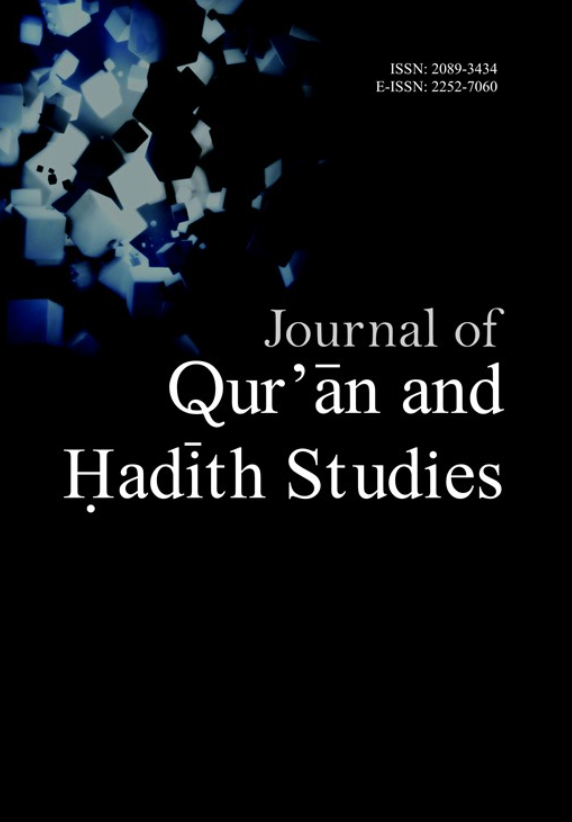An Examination of the Role of the Companions in Early Hadith Forgery
DOI:
https://doi.org/10.15408/quhas.v14i1.44422Keywords:
Revisionist, Traditionalist, Hadith Forgery, CompanionAbstract
The role that the Prophet's companions played in the campaign to fake hadiths is investigated in this article. There are two competing opinions regarding the genesis of the appearance of fake hadith, while both agree that political factors are the fundamental trigger. According to the first opinion, since the beginning of Islam, there have been incorrect hadith. The first group of Muslims, the Companions of the Prophet, are the ones who are at fault. The majority of Western Revisionist academics, led by Goldziher and Schacht, agree with this viewpoint; non-mainstream Islamic scholars, such Ahmad Amin and Abu Rayyah, endorse it. On the other hand, mainstream Islamic scholars, led by Muhammad Mustafa Azami, disagree, citing the Companions’ justification (‘adalah al-sahabah). This article attempts to evaluate the arguments using the abductive method. Opinions that correspond to the data are taken, which are contrary to the rejection. It follows that the view that the Companions were complicit in the hadith’s falsification is the one that is more grounded in scientific evidence. Conversely, the viewpoints that dispute it are founded solely on the widely accepted Companions’ conception of justice, which is better described as dogma than actual scientific knowledge.
References
Abdullah, A. (2018). New Horizons of Islamic Studies Through Socio-Cultural Hermeneutics. Al-Jami’ah: Journal of Islamic Studies, 41(1), 1–24. https://doi.org/10.14421/ajis.2003.411.1-24
Al-Mu’tazili, I. A. al-H. (n.d.). Sharh Nahj al-Balaghah (M. A. al-F. Ibrahim (ed.)). Dar al-Jayl.
Amin Abdullah, M. (2014). Religion, science and culture: An integrated, interconnected paradigm of science. Al-Jami’ah, 52(1), 175–203. https://doi.org/10.14421/ajis.2014.521.175-203
Amin, K. (2009). Menguji Kembali Keakuratan Metode Kritik Hadis. Hikmah.
Azami, M. M. (1978). Studies in Early Hadith Literature. American Trust Publication.
Brown, J. A. C. (2009). Hadith Muhammad’s Legacy in the Medieval and Modern World. Oneworld Publication.
Erika, M. (n.d.). THE KNOWLEDGE MANAGEMENT IN HADITH CODIFICATION. Riwayah Jurnal Studi Hadis, 8(1), 1–22. https://doi.org/10.21043/riwayah.v8i1.13675
Gottschalk, L. (1965). Understanding History: A Prime of Historical Method. Alfred A. Knopf.
Hallaq, W. (1999). The authenticity of Prophetic Hadith : Studia Islamica, 99(12), 75–90. http://www.jstor.org/stable/1596086
Isnaeni, A., & Susanto, I. (n.d.). CRITICISM OF MUSTAFA AZAMI’S CRITICAL THOUGHTS IN THE STUDY OF HADITH. Ulumuna, 27(2), 762–793. https://doi.org/10.20414/ujis.v27i2.758.
Jabali, F. (2005). Review: The Companions of the Prophet: A Study of Geographical Distribution and Political Alignments. In Journal of Islamic Studies (Vol. 16, Issue 1). https://doi.org/10.1093/jis/16.1.63
Juynboll, G. H. . (1992). Some Note on Islami’s First Fuqaha’ Distilled from Early Hadith Literature. Arabica, 39(No. 3), 291. http://www.jstor.org/stable/4057003
Mubin, M. F., Husna, J., & Kholis, N. (n.d.). Objectifitas Pemikiran Azami Tentang Sejarah Penulisan Hadis. Analisis Jurnal Studi Keislaman, 21(1), 141–164. https://doi.org/10.24042/ajsk.v21i1.8152
Potter, R. J. (1965). “Conflict, Decision, and Dissonace. by Leon Festinger.” American Journal of Sociology, Vol. 71(31). htttp://www.jstor.org/stable/2774460
Rahman, A., Hakim, L., & Anwar, M. K. (n.d.). MM Azami’s Contribution to Countering Hadith Skepticism and it’s Influence in Indonesia. Diroyah Jurnal Studi Ilmu Hadis, 8(2). https://doi.org/10.15575/diroyah.v8i2.35248.
Rakhmat, J. (2015). Asal-Usul Sunnah Şaḥābat: Studi Historiografis atas Tārīkh Tasyrī’. Disertasi, 1–301. http://repositori.uin-alauddin.ac.id/id/eprint/599
Rasyid, D., Rasyid, A. D., Lubis, A., Balwi, M. A. W. F. B. M., & Rasyid, B. D. (2021). The writing of hadith in the era of prophet muhammad A Critique on Harun Nasution’s Thought. Al-Jami’ah, 59(1), 191–220. https://doi.org/10.14421/ajis.2021.591.191-220
Saad, J., & Rabiu, A. A. (n.d.). Assessing Goldziher’s Claim of Fabrication of Hadith by the Companions of the Prophet. Al-Burhan Journal of Qur’an and Sunnah Studies, 3(2). https://doi.org/10.31436/alburhn.v3i2.137.
Said, E. W. (2009). The World, the Text, and the Critic. Harvard University Press.
Schacht, J. (1950). The Origin of Muhammadan Jurisprudence. Clarendon Press.
Shuhbah, A. (1989). Difa’ ’an al-Sunnah wa Radd Shubhat al-Mustashriqin wa al-Kuttab al-Mu’asirin. Maktabah al-Sunnah.
Sibai, M. (n.d.). As-Sunnah wa Makanatuha fi al-Tasyri’ al-Islami. Dar al-Warraq.
Stetkevyc, S. P. (2007). Al-Sharif al-Radi and the Poetics of ’Alid Legitimacy Elegy for al-Husain bin Ali on ’Ashura. Journal of Arabic Literature, Vol. 38(No. 38), 297. http://www.jstor.org/stable/25597957
Syarifah, U. (n.d.). Kontribusi Muhammad Musthafa Azami dalam Pemikiran Hadis (Counter atas Kritik Orientalis. Ulul Albab Jurnal Studi Islam, 15(2), 222–241. https://doi.org/10.18860/ua.v15i2.2728
Ulum, M. B. (n.d.). REKONSTRUKSI METODE KRITIK HADIS DENGAN PARADIGMA INTERDISIPLINER. Kordinat: Jurnal Komunikasi Antar Perguruan Tinggi Agama Islam, 21, 117–135. https://doi.org/10.15408/kordinat.v21i1.27672
Ulum, M. B. (2018). A-Muawiyat dalam Kajian Islam Ilmiah. Marja’.
Ulum, M. B. (2019). Genealogi Hadit Politis: al-Muawiyat dalam Kajian Islam Ilmiah. Marja’.
Ulum, M. B. (2022). The Companions Redefining Criteria and Reconsidering. 2, 105–123. https://doi.org/10.24014/Jush.v30i2.
Yahya, M., Puyu, D., Ilyas, Alwi, Z., & Mujahid. (2024). Comparative Critical Analysis of Methodologies for Establishing the Validity of Hadith Among Sunni and Shia. International Journal of Religion, 5(6), 777–792. https://doi.org/10.61707/31ec2561
Additional Files
Published
Issue
Section
License
Copyright (c) 2025 Muhammad Babul Ulum

This work is licensed under a Creative Commons Attribution-ShareAlike 4.0 International License.

